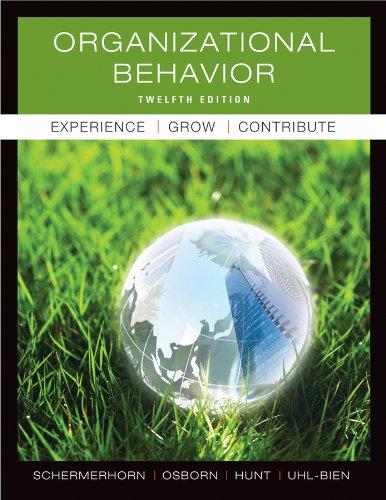1. As a large class group, generate a list of groups that tend to be targets of...
Question:
1. As a large class group, generate a list of groups that tend to be targets of prejudice and stereotypes in our culture —such groups can be based on gender, race, ethnicity, sexual orientation, region, religion, and so on. After generating a list, either as a class or in small groups, identify a few common positive and negative stereotypes associated with each group. Also consider relationships or patterns that exist between some of the lists. Discuss the implications for groups that have stereotypes that are valued in organizations versus groups whose stereotypes are viewed negatively in organizations.
2. As an individual, think about the lists you have now generated, and list those groups with which you identify. Write about an experience in which you were stereotyped as a member of a group. Ask yourself the following questions and write down your thoughts:
1. What group do I identify with?
2. What was the stereotype?
3. What happened? When and where did the incident occur? Who said what to whom?
4. What were my reactions? How did I feel? What did I think? What did I do?
5. What were the consequences? How did the incident affect myself and others?
3. Now, in small groups, discuss your experiences.
Briefly describe the incident and focus on how the incident made you feel. Select one incident from the ones shared in your group to role-play for the class.
Then, as a class, discuss your reactions to each role play. Identify the prejudice or stereotype portrayed, the feelings the situation evoked, and the consequences that might result from such a situation.
4. Think about the prejudices and stereotypes you hold about other people. Ask yourself, “What groups do I feel prejudice toward? What stereotypes do I hold about members of each of these groups?” How may such a prejudice have developed—did a family member or close friend or television influence you to stereotype a particular group in a certain way?
5. Now try to identify implications of prejudice in the workplace. How do prejudice and stereotypes affect workers, managers, relationships between people, and the organization as a whole? Consider how you might want to change erroneous beliefs as well as how you would encourage other people to change their own erroneous beliefs.
Step by Step Answer:

Organizational Behavior
ISBN: 9780470878200
12th Edition
Authors: John R. Schermerhorn, Mary Uhl-Bien, Richard N. Osborn





